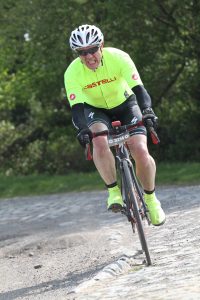When David Morgan travelled for 40 hours on a plane in just two weeks, he took the necessary precautions of wearing flight compression  socks and keeping hydrated.
socks and keeping hydrated.
But one month after returning from his trip to Argentina, he did not expect to be in Oxford’s John Radcliffe Hospital diagnosed with a clot in his calf and multiple pulmonary embolisms (PE) in his lungs.
The 61-year-old said: “On October 26, my wife Sarah and I boarded a flight to Argentina to visit our son who was volunteering as part of a year abroad.
“In the space of just over two weeks we spent at least 39 hours in aircraft seats.”
On returning home, the keen cyclist was ready to get back to his training programme in preparation for a ride in South Africa in March.
But training did not go to plan and David found it difficult to breathe.
“I used my inhaler which helped. The next day I had another short interval session planned but felt bad,” David said. “It was obvious I was getting an asthma episode as breathing was hard work. My asthma tends to creep up on me over days.
“I began my course of emergency steroids which seemed to work.”
A fortnight later, David was awoken by severe pain in his calf. After a call to 111, he was referred to his GP.
He said: “It felt like my calf was torn or cramping. It was slightly swollen but wasn’t hot, wasn’t red and all my vitals were normal.
“When asked if I had flown recently, I said ‘no’ – after all, it was a month ago.
“I was advised that if it got worse, I was to call again.”
The following day, David developed severe breathing problems and pain in his ribs and sternum.
Paramedics took him to John Radcliffe Hospital where he was given blood thinning medication as a clot could not be ruled out.
He returned the following day for a CT and leg ultrasound which showed a clot from mid-calf to thigh and multiple PEs.
“I was given blood thinning medication and painkillers and told I would receive a clinic appointment in due course,” he added.
David is still in the recovery process and has gradually been increasing his physical activity.
“The NHS has been brilliant, I have learned that despite everything, I am fortunate to have experienced first-class care and attention from my first contact with 111, my GP, the paramedics and the staff that have diagnosed and treated me with various interventions. I can’t thank them enough,” he said.
“When I look back it becomes obvious that I had done a huge amount of air travel. I had respiratory symptoms, but I thought it was asthma.
“My leg was fine until a month after returning home. If I hadn’t had asthma would I have contacted a doctor? I don’t think I would have, yet in hindsight it all points to a deep vein thrombosis and PEs building up over time.
“It seems to me that D-Dimer, CT and ultrasound are incredibly effective, but they are way down the line of events. I hope one day that there are some earlier diagnostic mechanisms available.”
David is supporting research into the condition and will be championing RBR Active’s #SeekHELP campaign which aims to educate people on the signs and symptoms of a blood clot.